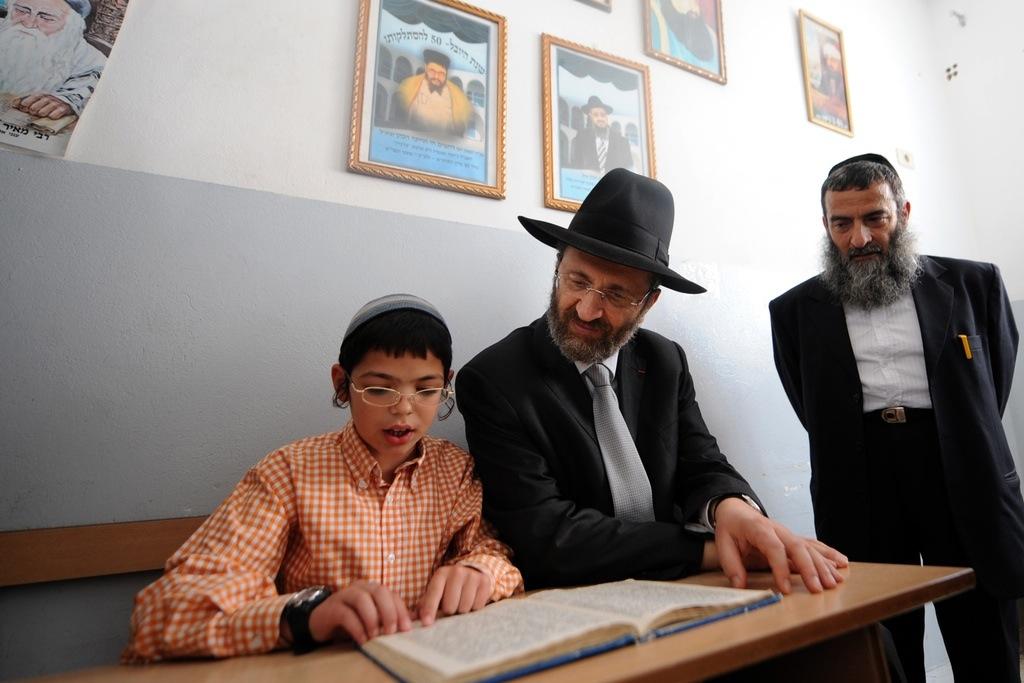Tunisia’s Jews ponder modern-day exodus
A Jewish Tunisian boy in the El-Hara Jewish school in Djerba on April 30, 2010.
DJERBA, Tunisia — As Jews around the world celebrate the Passover holiday this week, which commemorates the Biblical migration of the Israelites from ancient Egypt, some in Tunisia’s Jewish minority are considering their own modern-day exodus.
In the three months since the ouster of former strongman President Zine al-Abidine Ben Ali, Tunisia’s interim government has struggled to reinstate normalcy in this once prosperous Mediterranean nation.
For some in Djerba’s small Jewish community, many of whom work in the tourism industry, the financial uncertainty is becoming too much to bear.
The long absence of security on the streets in Tunisia seems to have scared away many foreigners and their vital tourist dollars, a large component of the country’s economy.
Most European tourists came for the whitewashed, dome-topped bazaars and lavish five-star hotels dotting the desert landscape on this resort island.
And with the conflict worsening next door in Libya — just a short drive from Djerba’s sunny beaches — Tunisia’s already battered tourism sector has largely dried up.
“I have only seen one customer all week long,” said Haddad Sion, the owner of a gold shop in Houmt Souq, the largest city in Djerba. “If business continues as is, I will have no choice but to leave, either to go to Paris or Jerusalem.”
Djerba has long been home to one of the oldest and largest communities of Jews in North Africa.
Their numbers have dwindled to about 1,500 over the past 50 years — only a tiny fraction compared to Tunisia’s nearly 10 million Muslim residents. At its peak in the 1950s, Tunisia's Jewish population numbered about 100,000, according to sociologist Claude Sitbon.
Djerba’s Jews have long coexisted peacefully with their Muslim neighbors, working side-by-side in the narrow alleyways of the old market in Houmt Souq that is now largely deserted.
Today, with secular Ben Ali out of the picture, Tunisia’s once-banned Islamists are making a political comeback – to the dismay of many of Djerba’s Jews.
“Ben Ali was good for the Jewish people,” said Daniel Sayada, a jeweler in Houmt Souq. “Since the revolution, being a Muslim is coming back in fashion. And I’m very uncertain on whether this is a good thing for us.”
The Islamist al-Nahda, or renaissance, movement has registered to form a political party and announced their intentions to compete in parliamentary elections scheduled for later this summer.
Al-Nahda members have argued that freedom and democracy in post-revolution Tunisia means that all political parties should have the chance to compete freely.
Still, some Jews here are fearful that Islamist leadership would drastically alter the laws in the secular North African state.
“We’re definitely scared about the idea of what a takeover by Al-Nahda would look like. I worry that many things here would change,” said Gabriel Attea, who has already moved his family from Djerba to Paris.
For Jews hoping to leave, Israel’s government is trying to make things easier.
After Tunisia's revolution, Tel Aviv offered several financial incentives toward the immigration of any Jews living in Tunisia, citing the economic hardships facing Jews in the post-Ben Ali era.
Local Israeli news reports also noted Tunisia’s increasing “Islamization” and the growing potential for anti-Semitism.
Tunisia’s interim government blasted Israel’s attempt to “to tarnish the image of post-Revolution Tunisia and arouse suspicions about the country's security, its economy and stability," according to Tunisia’s official TAP news agency.
But the option to emigrate may be resonating with some in Djerba.
“We are scared here. There’s just not enough security,” said Haddad, the gold vendor. “I fear an Islamist government that would try to change everything in Tunisia.”
Not all of Djerba's Jews are so worried about the future.
Mikhail Madar, a rabbi-turned baker, runs one of Djerba’s largest bakeries for handmade matzo, a cracker-like flat bread eaten during the Jewish Passover holiday.
Even though his brother has already left Tunisia for Israel, Madar said he would never leave Djerba: “This island has always been my home for centuries and will continue to be my home.”
We want to hear your feedback so we can keep improving our website, theworld.org. Please fill out this quick survey and let us know your thoughts (your answers will be anonymous). Thanks for your time!
